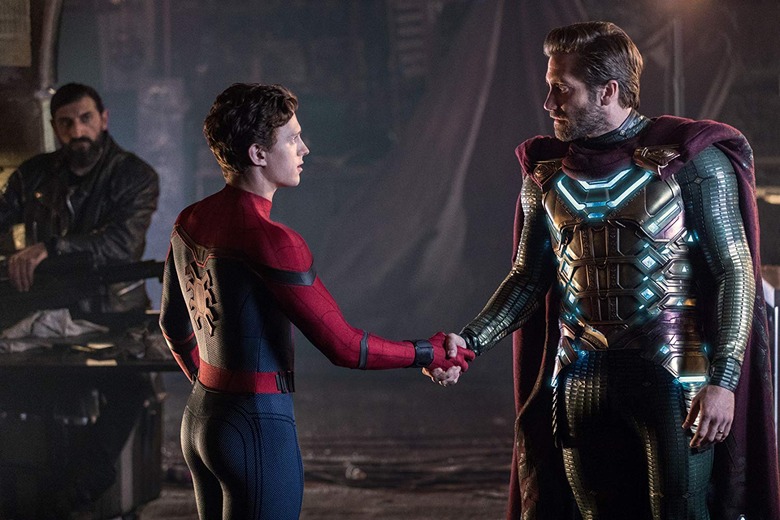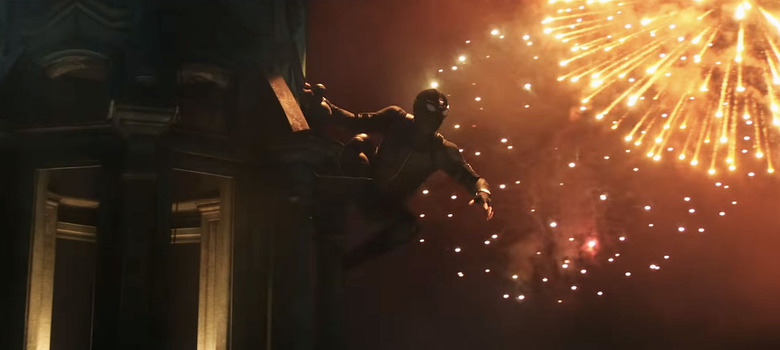'Spider-Man: Far From Home' Refuses To Reckon With The Past Failures Of The Marvel Cinematic Universe
(Welcome to Road to Endgame, where we revisit the movies of the Marvel Cinematic Universe and ask, "How did we get here?" In this epilogue, we explore how Spider-Man: Far From Home continues the MCU following the events of Endgame.)This post contains major spoilers for Spider-Man: Far From Home.In the first few breezy minutes of Marvel's latest entry, Peter Parker (Tom Holland) and his classmates deal, at least nominally, with the effects of "The Blip" — a more palatable term than "The Decimation" — which saw half the world return from dust after a five-year interval. As luck would have it, the main cast from Spider-Man: Homecoming remains largely intact, since they were all wiped away. Now joined by new addition Brad (Remy Hii), a teenage hunk who was only a skinny tween when Parker last saw him, the kids all take a trip to Europe and mayhem ensues. Though besides Brad's presence, only a brief mention of Queens' homelessness problem and a tongue-in-cheek 'In Memoriam' slideshow make Spider-Man: Far From Home feel like it exists in the aftermath of an apocalyptic time-slip.The trauma of dying during "The Blip" was handwaved in Avengers: Endgame — Parker, upon his resurrection, assumes he "must have passed out" — and why harp on the macabre here, in a teen comedy, anyway? Although, while Far From Home takes a wry approach to global catastrophe, it also rightly condenses the associated grief by grounding it in a single relationship: that of Peter Parker and his Uncle Ben in this series, the late Tony Stark (Robert Downey Jr.).Though in making Stark a centerpiece once more, the Marvel series arrives at a vital crossroads: how will these films memorialize their own legacy?
The Ghost of Tony Stark
"I see his face everywhere I go," says Parker about his martyred mentor. The high-schooler's re-introduction has him framed by classroom drawings of the heroic Iron Man, though he seems unfazed by this as he lays out his plan to woo M.J. (Zendaya) in Paris. Despite his claims of being plagued by Stark's memory, there are but a handful of instances where reminders of Stark seem to impact the web-slinger. When he sits perched atop a building and reflects on his failures, he's overshadowed by an Iron Man mural; when he fights Mysterio (Jake Gyllenhaal), the trickster induces nightmarish visions of a zombified Stark, though neither of these encounters are as confrontational as they ought to be.This isn't a story where Parker tries to have a good time despite the spectre of loss. It's a story where loss is incidental, informing plot mechanics and technology, while the dramatic tension stems from Parker avoiding heroism because he wants to go on vacation. What's more, the film's refusal to meaningfully confront Parker's feelings on Stark has thematic ripple-effects for the rest of the MCU. Spider-Man: Far From Home is an attempted inverse of Spider-Man: Homecoming, a film in which Parker is desperate to be an Avenger, but a film where he chooses to reject his eventual promotion (albeit through no real dramatized change). However, the key difference between the two films is how they frame the presence of Tony Stark. Parker's father-figure cannot, of course, appear physically in Far From Home, but the main advantage enjoyed by its predecessor was Parker's heroism existing in the shadow of not only Stark's iconography, but in the shadow of his mistakes. Homecoming felt distinctly in-step with the films preceding it; Stark revoked Parker's suit because he didn't want a teenager walking in his footsteps, re-treading the same ground and causing the same collateral damage — an idea that feels all but discarded here. In Far From Home, the ghost of Tony Stark is a more idyllic presence. His friend Happy Hogan (Jon Favreau) mentions that Stark was "a mess," but the film only ever treats the deceased Avenger like a painting on a wall. A cartoon superhero off in the distance, as the rest of the world saw him — despite the dramatic focus being characters who were closest to him, and knew his faults intimately. Take, for instance, the scene in which Parker is left Stark's EDITH tech, spectacles that allow the high-schooler unlimited access to personal data and unchecked control over lethal drones. This subplot, despite all its uncomfortable real-world parallels, is mined for comedic effect — Parker almost kills his whole class! — and gels poorly with the last entire decade of Marvel's narrative. Stark, who began his journey in Iron Man as a private weaponeer, eventually grew to see the need for oversight (see: his mistakes leading up to Avengers: Age of Ultron, which led to this turn in Captain America: Civil War), yet the series walks back its own long-term through-line, as Far From Home refuses to meaningfully confront this contradiction.
The EDITH Conundrum
The problem posed by Parker's inheritance isn't just whether he thinks he's worthy of Stark's legacy — which the film deals with adequately — but whether Stark's legacy is one worth accepting without question. A decade of Marvel's films dealt with militaristic responsibility (which I covered in detail in my Road to Endgame series), and a decade more dealt with Parker, in his various iterations, wrestling with those same questions of power in microcosm. Spider-Man: Far From Home however, untethers itself from both characters' cinematic legacies. Instead, it pivots the series toward a bizarrely un-critical take on the subject; the film never raises the question of whether this sort of power can be wielded responsibly.Granted, the MCU has always been hesitant in criticisms of overreach, so this direction isn't unprecedented. Captain America: The Winter Soldier spoke of dismantling harmful government structures, but it framed their origins as fictitious outside actors, rather than anything resembling real-world politics; Captain Marvel tried to have an anti-imperialist message, though it framed American military imperialism as de-facto good (both films were funded, in part, by the U.S. military). Spider-Man: Far From Home departs even further, eschewing the responsibility conversation entirely. Where Parker might have wrestled with balancing the power and responsibility handed down to him by Stark, he instead wrestles with whether or not he can balance heroism with his romantic pursuits, a story that exists regardless of his fallen mentor. It's the kind of intimate, personal tale a Spider-Man movie ought to tell, but the Marvel Cinematic Universe tries to have its cake and eat it too, foisting grand shared-universe ideas upon a small-scale narrative, but ideas that override Parker's European getaway and make his perspective seem woefully narrow.Parker places power in the wrong hands when he gives EDITH to Mysterio, but neither he nor the film stop to ask which hands are the right ones — one of the series' continued narrative failings.
Ignoring Perspective
Within mere weeks of Stark's death, his legacy is viewed by the world through rose-tinted glasses. Parker, in his grief, speaks only of how he misses the man, and how Stark was a hero in a way Parker himself could never be. And while Hogan's brief pep-talk convinces Parker otherwise (Stark being unable to live up to the ideals of Iron Man is a potent idea), it's mere lip-service to get the plot moving again; it's neither wit nor will, but a private jet and the gift of expensive nanotech that propels Parker toward the climax.Despite a group of villains who worked closely with Stark and feel wronged by his success, their unfavourable view of the tech mogul never once clashes with Parker's idyllic outlook. The film even inadvertently repeats a central blind-spot of its predecessor. Spider-Man: Homecoming used a Stark-hating Vulture as Peter's antagonist, though the Vulture's musings about Stark as a selfish billionaire fail to make the similarly working-class Parker second guess his allegiances (Vox's Emily VanDerWerff notes that Far From Home similarly "turns a class-conscious hero into a tech bro").Stark's spectre looms large in the form of not only those he cast aside and stole credit from, but in the very real, very immediate harm his tech can still cause. Yet in the wake of his death, Stark's very human complexity which once drove the series is all but tossed aside. Once the killer drones are stolen, the confrontations between Mysterio and Spider-Man neither call into question their clashing perspectives on Stark — Parker is never even made aware of Mysterio's grudge — nor do they explore the tensions between Stark as the public knew him, and Stark as he was known to those he spurned. This, despite Mysterio's constant allusions to a post-truth world whose narratives he hopes to control (he all but winks at the camera and yells "fake news").The EDITH drones are eventually destroyed, but only because they're a bane in Mysterio's hands, rather than a bane in concept. Instead of challenging Parker, the film chooses to coddle him by leaning in to his mentor's iconography, and his iconography alone. Its scenes of Parker using Stark-tech set to AC/DC are both a throwback to the original Iron Man and a clear wink to the audience, indicating that the idea of Iron Man (a tech-savvy hero with access to unlimited resources) will remain intact in the MCU — but in a manner that avoids internal confrontation and continues fawning over the status quo.Thus, the legacy Spider-Man is tasked with embodying is not that of Tony Stark, the man, who made grave mistakes as he wrestled with morality, but that of Iron Man the cypher. As if we, the audience, had not spent a full decade watching Stark make mistake after mistake, only to confront each problem with a newer, more dangerous one; a perpetual moral puzzle that extends beyond his demise.For a film that follows Avengers: Endgame, in which heroes travel back in time and confront their own histories, Spider-Man: Far From Home seems far too content with closing the door on the past. After building a sprawling, inter-connected narrative, Marvel's 23rd entry feels not like an epilogue to the main story, but a request for a clean slate; a plea for its audience to forget the failings of its films and characters, and to instead accept their iconography at a distance.There is no moment in which Parker, or the audience, is challenged by the idea that even grief may involve accepting unpleasant truths about people, and symbols, and how we remember them. The text, therefore, cannot help but read like a reflection of the current American zeitgeist, in which vast, inhumane problems are seen as mere glitches in a system, rather than the system working at its optimum; the "This is not who we are!" to the more difficult "This is who we've always been." For all its oversaturation and misuse in political discourse, the Harry Potter series at least forced its teen hero to confront the flaws of his father-figures. It did what these Spider-Man films, and the Marvel series at large, seems frustratingly resigned not to: it grew up.



